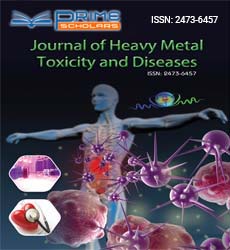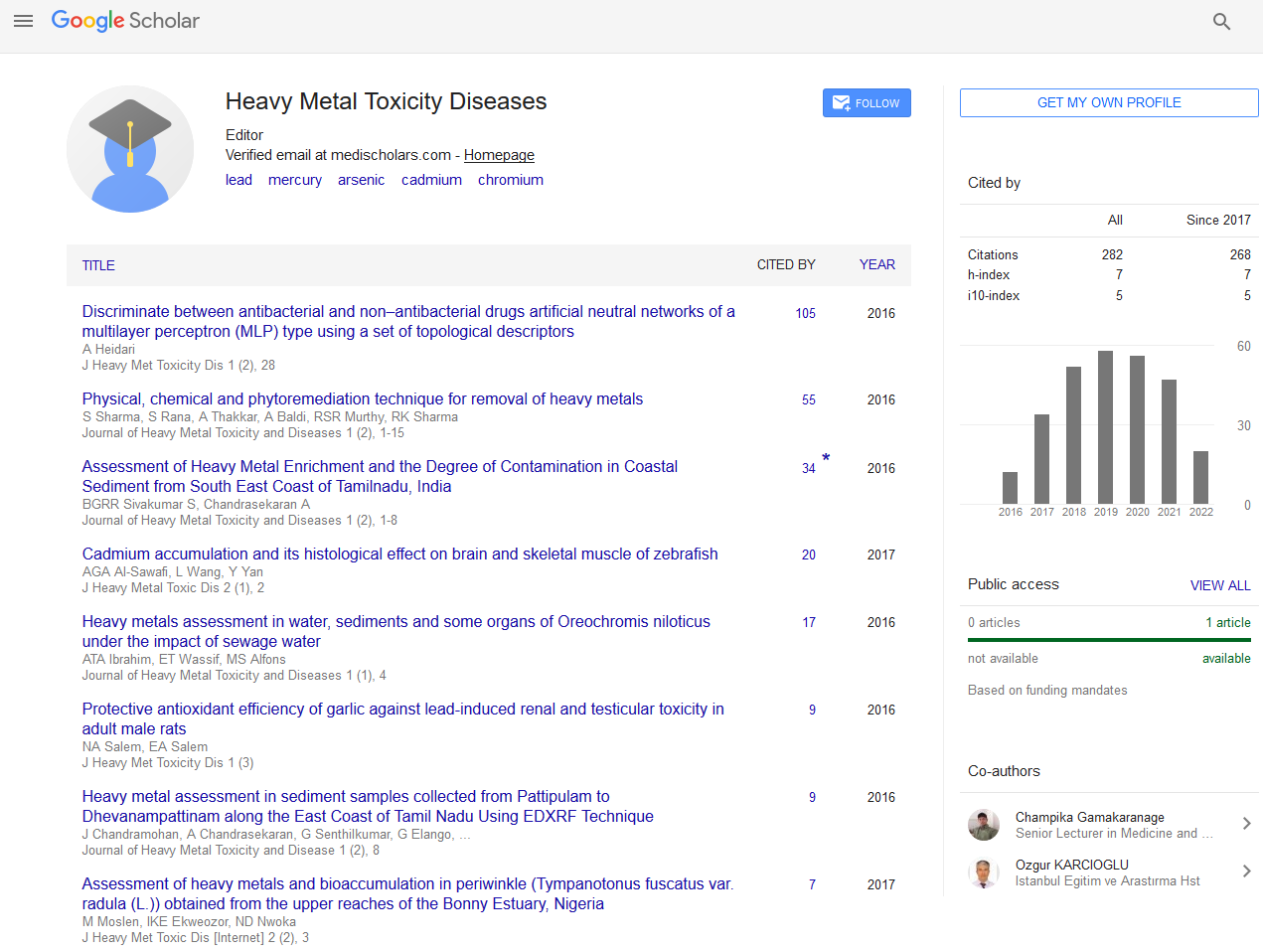Short Communication - (2023) Volume 8, Issue 2
Herbal Remedies for Heavy Metal Poisoning: Nature's Detoxifiers
Zimo Xu*
Department of Herbal Medicine, Xidian University, China
*Correspondence:
Zimo Xu,
Department of Herbal Medicine, Xidian University,
China,
Email:
Received: 01-Mar-2023, Manuscript No. ipjhmct-23-17413;
Editor assigned: 03-Mar-2023, Pre QC No. ipjhmct-23-17413 (PQ);
Reviewed: 17-Mar-2023, QC No. ipjhmct-23-17413;
Revised: 22-Mar-2023, Manuscript No. ipjhmct-23-17413 (R);
Published:
29-Mar-2023, DOI: 10.21767/2473-6457.23.2.20
Introduction
Heavy metal poisoning is a serious health concern caused by the
accumulation of toxic metals such as lead, mercury, cadmium,
and arsenic in the body. These metals can enter the body through
various sources including contaminated food, water, air, and even
certain medical treatments. The consequences of heavy metal
poisoning can range from mild symptoms to severe health issues.
While conventional medical treatments exist, herbal remedies
have gained attention for their potential role in aiding detoxification
and supporting the body’s natural processes.
Description
Chelation is a process that involves binding to heavy metals and
facilitating their removal from the body. Certain herbs contain
compounds that exhibit chelating properties, aiding in the elimination
of toxic metals. Some commonly used chelation herbs
Cilantro has shown promise in its ability to bind to heavy metals
and assist in their excretion through urine. Additionally, cilantro
contains antioxidants that can help mitigate oxidative stress
caused by metal toxicity. Chlorella is a type of freshwater algae
that has a natural ability to bind to heavy metals, facilitating their
elimination. It’s rich in chlorophyll, which assists in detoxification
by supporting the body’s cleansing mechanisms [1]. Turmeric is
well-known for its anti-inflammatory and antioxidant properties.
Its active compound, curcumin, has been studied for its potential
to counteract the harmful effects of heavy metal exposure.
Curcumin’s ability to support liver function enhances the body’s
natural detoxification processes. Another potent algae, spirulina,
has shown promise in reducing metal toxicity. Its high chlorophyll
content helps eliminate heavy metals by binding to them, thereby
reducing their absorption in the digestive tract. Chlorella contains
chlorophyll and fiber, which can assist in binding to heavy
metals, preventing their absorption, and promoting their excretion.
Regular consumption of chlorella supplements is believed
to support detoxification. Garlic contains sulphur compounds
that can aid in the detoxification process by promoting the production
of glutathione, a powerful antioxidant that assists in
neutralizing heavy metals and other toxins. Amla, also known as
Indian gooseberry, is a rich source of vitamin C and antioxidants
[2]. Vitamin C aids in neutralizing free radicals and supporting
the body’s immune system, which can be compromised by heavy
metal exposure. The combination of cilantro and chlorella has
gained popularity as a powerful natural chelation method. Cilantro
mobilizes heavy metals from tissues, while chlorella binds to
and facilitates their elimination [3]. Triphala is an herbal blend
from Ayurvedic medicine composed of three fruits: Amla, bibhitaki,
and haritaki. It supports digestion, gut health, and detoxification,
which indirectly aids in removing heavy metals from the
body [4]. While herbal remedies hold promise, it’s important to
approach their use with caution. Consulting a healthcare professional
before incorporating herbal remedies into your detoxification
regimen is crucial. Herbal remedies should not replace medical
treatment but can complement it. Additionally, adopting a
balanced diet rich in antioxidants, maintaining proper hydration,
and minimizing exposure to heavy metals are essential steps in
preventing and managing metal toxicity. Incorporating these
herbal allies can be a part of a holistic approach to mitigating the
harmful effects of metal toxicity, promoting overall well-being
through natural detoxification methods.
Conclusion
Herbal remedies offer a potential complementary approach to
conventional treatments for heavy metal poisoning. However,
it’s essential to approach herbal treatments with caution and
under the guidance of a qualified healthcare professional. While
herbs can aid in detoxification, they are not a standalone solution
and should be used as part of a comprehensive approach that
includes proper medical assessment, lifestyle adjustments, and
dietary changes.
Acknowledgement
None.
Conflict Of Interest
The author states there is no conflict of interest.
References
- Al-Saleh, Mustafa A, Taylor A (1996) Lead exposure in the city of Arar, Saudi Arabia. Arch Environ Health. 51(1):73-82.
[Crossref] [Google Scholar]
- Bassil M, Daou F, Hassan H (2018) Lead, cadmium and arsenic in human milk and their socio-demographic and lifestyle determinants in Lebanon. Chemosphere. 191:911-921.
[Crossref] [Google Scholar]
- Buil-Gil D, Moretti A, Langton SH (2022) The accuracy of crime statistics: Assessing the impact of police data bias on geographic crime analysis. J Exp Criminol. 18(3):515-541.
[Crossref] [Google Scholar]
- Chowdhury S, Kabir F, Mazumder MA, Zahir MH (2018) Modeling lead concentration in drinking water of residential plumbing pipes and hot water tanks. Sci Total Environ. 635:35-44.
[Crossref] [Google Scholar]
Citation: Xu Z (2023) Herbal Remedies for Heavy Metal Poisoning: Nature’s Detoxifiers. J Heavy Met Toxicity Dis. 08:20.
Copyright: © 2023 Xu Z. This is an open-access article distributed under the terms of the Creative Commons Attribution License,
which permits unrestricted use, distribution, and reproduction in any medium, provided the original author and source are
credited.

